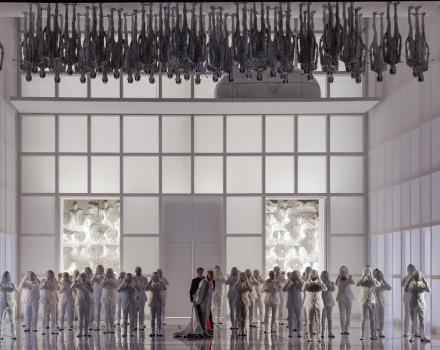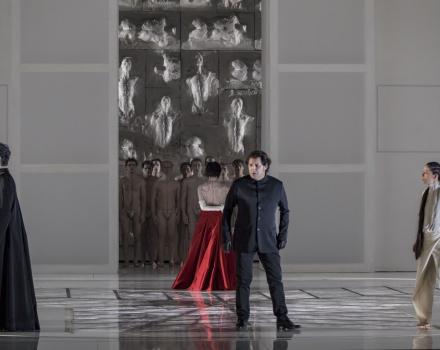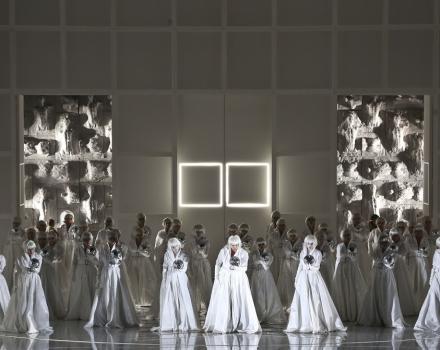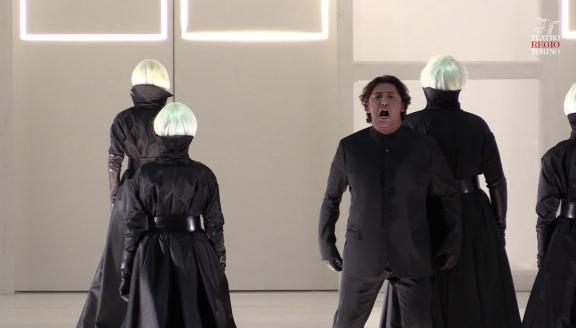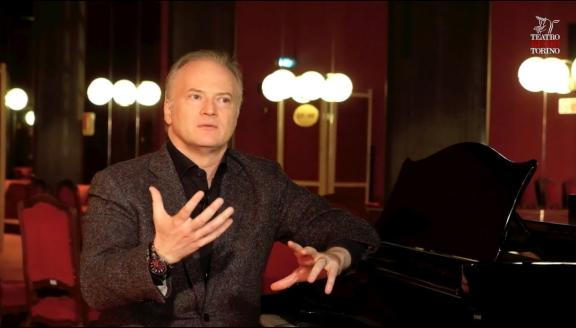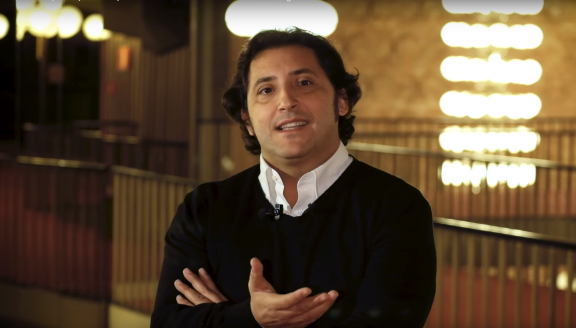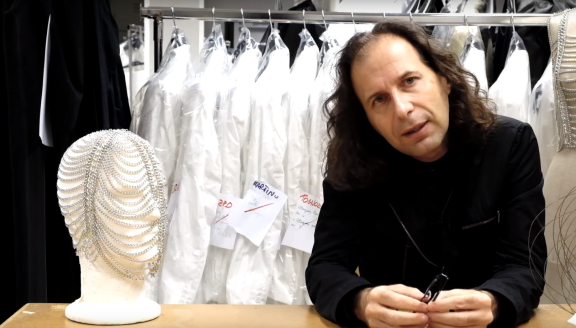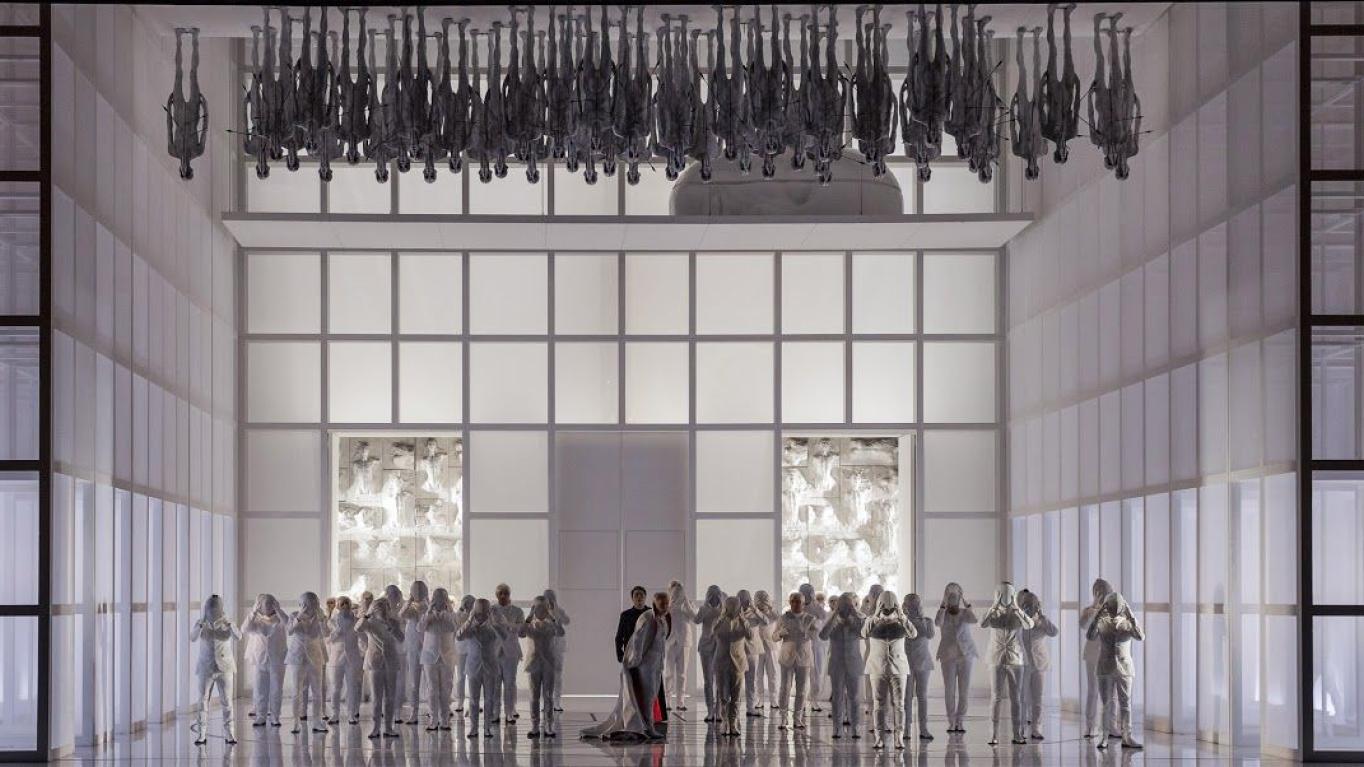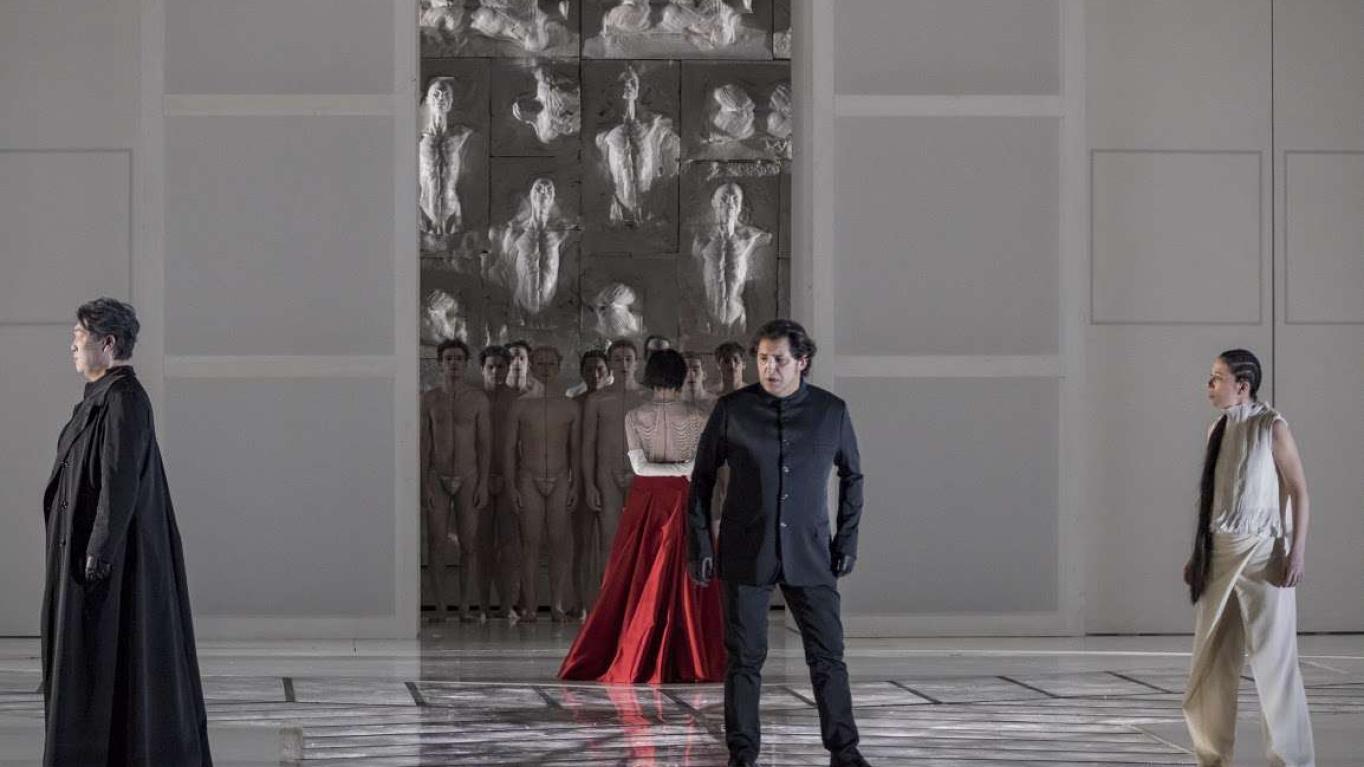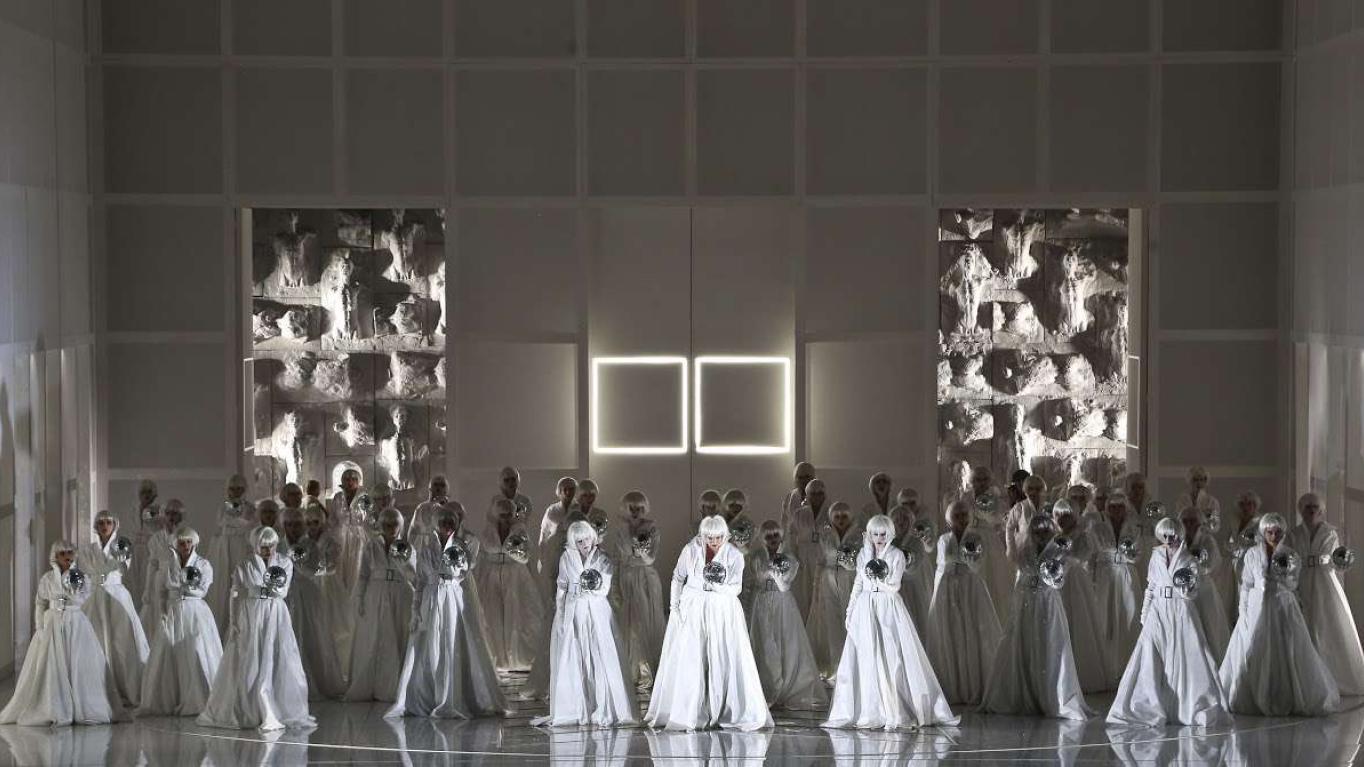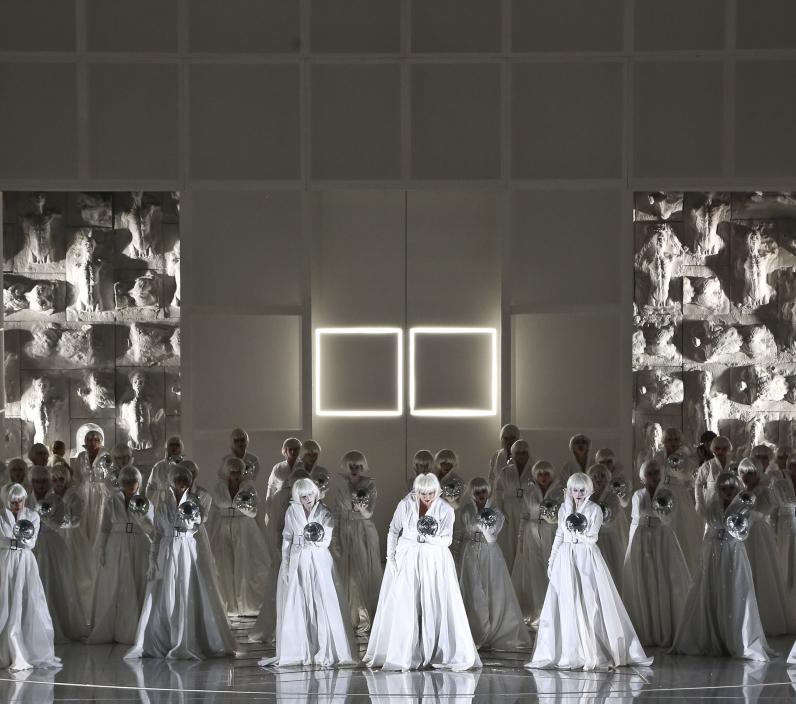

Turandot is an elusive character in her own opera, at the same time present and absent...
Cast
|
Turandot
|
Rebeka Lokar
|
|---|---|
|
Calaf
|
Jorge de León
|
|
Liù
|
Erika Grimaldi
|
|
Timur
|
In-Sung Sim
|
|
Altoum
|
Antonello Ceron
|
|
Ping
|
Marco Filippo Romano
|
|
Pang
|
Luca Casalin
|
|
Pong
|
Mikeldi Atxalandabaso
|
|
A Mandarin
|
Roberto Abbondanza
|
|
Prince of Persia
|
Joshua Sanders
|
|
Chorus
|
Coro del Teatro Regio
|
|
Orchestra
|
Orchestra del Teatro Regio
|
| ... | |
|
Music
|
Giacomo Puccini
|
|---|---|
|
Conductor
|
Gianandrea Noseda
|
|
Director
|
Stefano Poda
|
|
Sets
|
Stefano Poda
|
|
Lighting
|
Stefano Poda
|
|
Costumes
|
Stefano Poda
|
|
Text
|
Giuseppe Adami and Renato Simoni, on Carlo Gozzi
|
|
Chorus master
|
Claudio Fenoglio
|
| ... | |
Video
The story
Act 1
The walls of the great purple City.
Peking, legendary times. A bustling crowd in front of the walls of the imperial City. A Mandarin is again reading out Princess Turandot’s proclamation declaring she will marry the prince who succeeds in solving her three riddles, but whoever accepts the challenge and mistakes the replies will be beheaded as the moon rises. This is what is about to happen to the latest pretender, the Prince of Persia. In the throng a blind old man is trampled: Calaf rushes to assist him and recognises his father, the deposed Tartar king, Timur. The old king believed his son had died in battle: now he has lost everything; only the slave Liu has stayed with him. The girl confesses that she had helped the king because one day, in the palace, Calaf had smiled at her.
The excited crowd invokes the rising of the moon and calls for the executioner, but when the Prince of Persia is led forwards its mood changes – moved by his tender age and noble bearing – and instead it implores pardon for the young man. Turandot makes a sign ordering his execution. Struck by the fleeting glimpse of the icy Princess, Calaf decides to tackle the three riddles. Ping, Pong and Pang, Turandot’s three ministers, attempt to persuade him that Turandot is after all only a woman and that there are many others he could have without risking his life in vain. Liu asks what will become of her and Timur if he were to die, but Calaf is deaf to her supplications and, calling out Turandot’s name, announces he will accept the challenge and sounds the ritual gong.
Act II – Scene I
A pavillon.
Ping, Pong and Pang let their frustration show. They are tired of a routine of unsolved riddles and decapitated heads and hope that Turandot will finally find a husband so they can retire. But, alas, preparations must be made for the new pretender’s attempt.
Act II – Scene II
Square in front of the palace.
While the crowd gathers, the sages arrive bearing the rolls with the answers to the riddles. Turandot’s father, the elderly Emperor Altoum, invites Calaf in vain to desist. Finally Turandot appears. The beautiful princess relates how she dreamt up the game of riddles to revenge Lo-u-Ling, an ancestor of hers who, thousands of years ago, had been raped and killed by a foreign king. For this reason she hates men. Turandot is sure that no one will be able to solve the riddles and thus possess her, and wholeheartedly believes that the young prince is destined to the gallows. But Calaf does not give up, and one by one succeeds in resolving the riddles posed.
Devastated, Turandot asks her father not to relinquish her to the foreign prince but Altoum reminds her she is bound by oath. Boldly, Calaf proposes that she should successfully answer a riddle in her turn: if Turandot can find out his real name before the sun rises he will gladly die, otherwise the princess must marry him. Disconsolate, the old emperor hopes the young man will be able to marry Turandot and thus become his son.
Act III
Garden of the palace.
During the night, the heralds proclaim Turandot’s orders: no one in the city must sleep and every attempt must be made to discover the foreign prince’s identity. Calaf anxiously awaits the coming of dawn and looks forward to the moment when the sun will rise and he will be able to embrace Turandot. Ping Pong and Pang offer him immense riches and the most beautiful women in an attempt to make him renounce the princess, but Calaf rejects every enticement.
A little while later a group of the princess’s guards arrives dragging Liu and Timur with them: the two have been seen in the prince’s company and probably know his identity. Turandot arrives too. Under torture, Liu confesses that she knows the prince’s name but has no intention of revealing it. For love of the prince, she wants to grant him, with her silence, Turandot’s hand, who in her turn can do nothing but love him. So she snatches one of the guard’s daggers and kills herself, thus carrying her secret to the grave. In desperation, Timur clasps Liu’s hand as she is borne away, accompanied by the much moved crowd.
Insights
Turandot and Liù
Turandot is one of the most famous operas in the world. Who hasn’t heard Nessun dorma, whether in the context of the greater work or as a standalone aria? No one sleeps in the aria, for fear of death, for Turandot searches for the name of the Prince she does not want to marry, preferring to have him put to death – until she suddenly changes her mind. We see an image of a proud woman, one that seems unlikely to want to prepare for her own wedding on short notice, and yet, the opera ends in textbook fairy tale fashion, in defiance of the tragic death of Liù – a woman brutally passed over.
We now turn to the intertwined destinies of Liù and Turandot. The latter is fierce. She is angry. She is her own boss. And she is cruel: Liù has allowed herself to be tortured and sacrifices her life for love, and Turandot does not seem to care. Turandot embodies a spirit of independence in her fury: her ancestress was raped and murdered, and she, in short, wants to avenge her predecessor. There are important themes here that deal with independence and women’s roles in societies both past and present.
And what about Liù? She has begged Calaf not to engage in the life-and-death game the Princess has set out with her riddles (Signore, ascolta!) but he has ignored her rather sound advice.
Yet Puccini died before he could finish this masterpiece. Most opera companies perform the version finished by Franco Alfano, which is less than believable. Calaf and Turandot’s quickly arranged wedding is nowadays often ridiculed as an unrealistic ending that is not true to the composer’s original artistic intentions. In fact, Alfano wrote a second, more oft-performed ending, after his first version was heavily criticized. Luciano Berio’s 2001 version is seen as more seamless and less reverential, but it is essentially the same narrative. Puccini had sketched this about-face, but he had been troubled by its unbelievability and had been working on finding a better dramatic solution.
Choice is an important theme in this opera. Both Turandot and Liù make important choices. The Princess focuses on protecting herself at any cost, while the enslaved young woman Liù gives her life protecting someone who does not even appreciate her sacrifice: after Liù dies, Calaf kisses Turandot. Fascinatingly, even though one woman has effectively killed the other, the story provides enough context for the audience to begin understand both women’s courses of action, even if Turandot’s choice does not merit sympathy. In Calaf and Turandot’s newfound joy we see something false. Liù’s death still resounds, unfinished, unsolved, rendered obsolete by Calaf’s callousness.
The complexity of the thematic material in Turandot seems to call for more reflection than a simple marriage between Prince Calaf and Princess Turandot, not to mention the issues that might ensue when the newlyweds began to talk about recent events, where heads rolled. Perhaps Calaf might even wake up and realize that the woman who gave her life for him was taken from the world by the woman who now shares his life. An interesting dichotomy, and one that Puccini would likely have explored more fully had he had time to finish the opera himself.
Gallery
